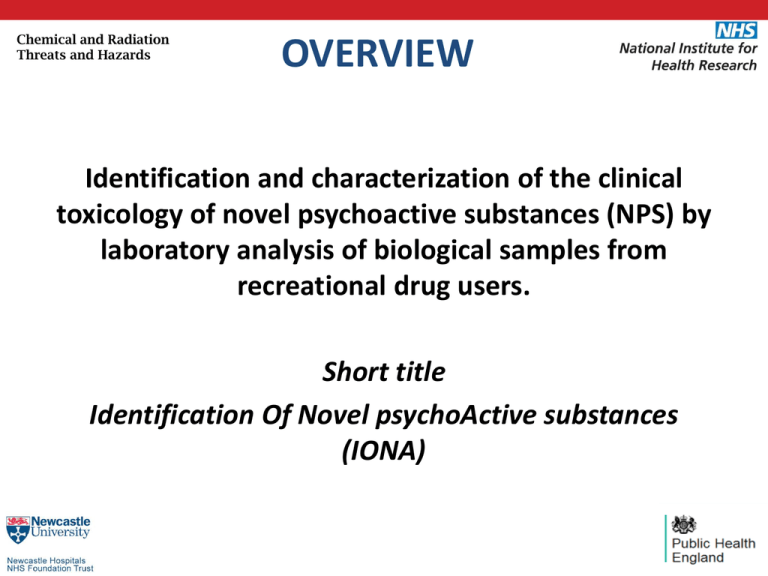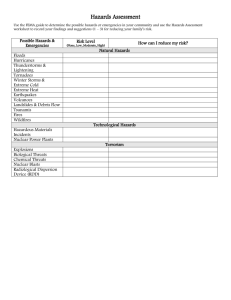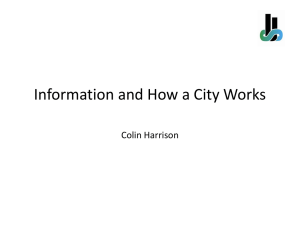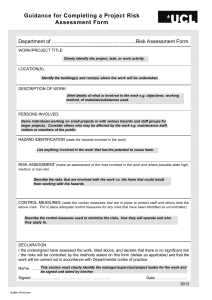OVERVIEW
advertisement

Chemical and Radiation Threats and Hazards OVERVIEW Identification and characterization of the clinical toxicology of novel psychoactive substances (NPS) by laboratory analysis of biological samples from recreational drug users. Short title Identification Of Novel psychoActive substances (IONA) Chemical and Radiation Threats and Hazards IONA Study Overview National Poisons Information Service • • • • Clinical data from cases of suspected NPS exposure Edinburgh Newcastle Birmingham Cardiff NHS Hospitals HPRU Newcastle NHS Toxicology labs • Laboratory analysis • Data processing Samples and clinical data from patients with severe NPS toxicity • Wansbeck • Birmingham • Cardiff Forensic Toxicology labs • Scottish Police Authority (Edinburgh) Data on samples positive for NPS Samples for identification of NPS • • • • • • • • • • • • • Bart’s, London Blackpool Cardiff Edinburgh Liverpool London Hospital Newcastle Northumbria North Manchester Plymouth Southport & Omskirk St Georges, London St Thomas’, London • ..more to follow Chemical and Radiation Threats and Hazards IONA Study Overview Identify trends in enquiries to the NPIS (telephone and internet) relating to NPS and characterize and monitor the epidemiology of reported exposures Further develop methods of screening, analysis and quantification for new/emerging NPS in biological samples (urine, oral fluid and blood) Identify trends in the numbers of samples positive for NPS as identified in participating NHS laboratories Analyse samples from patients with acute severe toxicity relating to NPS to identify responsible agents Develop sophisticated mathematical models for analyzing NPIS and toxicology laboratory data Link the presence of analytically confirmed NPS exposure with the toxic effects experienced Chemical and Radiation Threats and Hazards IONA Study Overview Study 4. Collection of samples for research purposes from people attending participating emergency departments (Post amendment 1) Study 4 Inclusion criteria Exclusion criteria Patient with suspected novel Refusal of consent psychoactive substance exposure Absence of severe toxicity Presence of severe acute toxicity Children and young people <16 y (See text) Samples collected for investigation of Patient consent (immediate or retrospective) suspected non-accidental injury Chemical and Radiation Threats and Hazards IONA Study Recruitment Chemical and Radiation Threats and Hazards Criteria for severe toxicity (present at any time after exposure) (Post amendment 1) Fever > 38.5 oC Clinically important hypothermia Glasgow coma scale < 8a ITU/HDU/CCU admission Respiratory insufficiency Requirement for intubation and ventilation Seizures Hallucinations/psychosis Extreme agitation Severe or prolonged (> 24 h) behavioural disturbance Arrhythmia Chest pain or ECG evidence of cardiac ischaemia or myocardial infarction aIn Acidosis (arterial or venous pH < 7.35 or bicarbonate < 20 mmol/L) Severe electrolyte or fluid disturbances Hypoglycaemia (<1.7 mmol/L) Methaemoglobinaemia (>50%) Tachycardia > 140 /min SBP > 180 mmHg SBP < 80 mmHg Acute kidney injuryb Creatine kinase activity raised (> 1000 IU/L) ALT/AST activity > 300 IU/L PT > 15 s or INR > 1.3 Death Poisons Severity Score61 of 3 (Severe) c Other severe manifestations of toxicity, as determined and justified by the investigator the absence of likely alternative causes (e.g. severe alcohol intoxication, use of sedative drugs etc). as a rise in serum creatinine of ≥26 micromol/litre within 48 hours, a 50% or greater rise in serum creatinine known or presumed to have occurred within the past 7 days, or a fall in urine output to less than 0.5 ml/kg/hour for more than 6 h63 cCriteria for PSS 3 relevant to recreational drug use include abnormal chest Xray with symptoms, generalized paralysis, blindness or deafness bDefined Chemical and Radiation Threats and Hazards Study website http://www.ncl.ac.uk/hpru/research/neuro/nps/ Chemical and Radiation Threats and Hazards Participant information sheet Chemical and Radiation Threats and Hazards Consent form Chemical and Radiation Threats and Hazards Consultee information sheet Chemical and Radiation Threats and Hazards Consultee declaration form Chemical and Radiation Threats and Hazards Consent form (person previously included when they did not have capacity Chemical and Radiation Threats and Hazards Consent form (person previously included when they did not have capacity Chemical and Radiation Threats and Hazards Data provided • Clinical records retained by the local researcher. • Information passed on to the research team in Newcastle will include – – – – – study number the age, sex and postcode (first 4 digits) of the patient nature and timing of the exposure timing of sample collection recorded clinical features (structured data collection form). – The great majority of samples and data will be provided with consent – there will be a small number of samples collected without consent from adults with incapacity by means of appropriate declarations from consultees (England and Wales) Chemical and Radiation Threats and Hazards Chemical and Radiation Threats and Hazards Case report form (Page 1) Chemical and Radiation Threats and Hazards Data collection sheet (Jan 2016 Version) (page 1) Chemical and Radiation Threats and Hazards Data collection sheet (Jan 2016 Version) (page 2) Chemical and Radiation Threats and Hazards Chemical and Radiation Threats and Hazards Contact details • Simon Thomas (CI) • Tel 0191 2824642 • email simon.thomas@ncl.ac.uk



